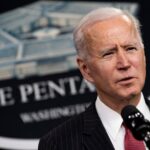WASHINGTON – President Joe Biden paused approvals for pending and future applications to export liquefied natural gas from new projects on Friday, a move cheered by climate activists that could delay decisions on new plants until after the Nov. 5 election.
The Department of Energy (DOE) will conduct a review during the pause that will look at the economic and environmental impacts of projects seeking approval to export LNG to Europe and Asia where the fuel is in hot demand.
The review will take months and then will be open to public comment which will take further time, Energy Secretary Jennifer Granholm told reporters in a teleconference.
Biden said in a statement: “During this period, we will take a hard look at the impacts of LNG exports on energy costs, America’s energy security, and our environment.” He said the pause “sees the climate crisis for what it is: the existential threat of our time.”
Administration officials vowed the pause would not hurt allies, saying the plan will come with exemptions for national security should they need more LNG.
“We are committed to strengthening energy security here in the U.S. and with our allies,” Granholm said.
Companies and countries in Europe are worried about steady supplies of U.S. gas as the region tries to wean itself off pipelined gas from Russia after its 2022 invasion of Ukraine. U.S. allies in Asia also covet LNG as they seek to slow coal consumption.
The last review of LNG export projects was in 2018 when export capacity was 4 billion cubic feet per day (bcfd). That capacity has tripled, with the U.S. becoming the world’s top LNG exporter last year, and is set to shoot higher by 2030 with projects under construction.
The growth has set off protests from environmentalists, part of Biden’s base. Activists say new LNG projects can harm local communities with pollution, lock in global reliance on fossil fuels for decades, and lead to emissions from burning gas and from leaks of the powerful greenhouse gas methane.
Environmentalists hailed the move as a bold step.
It “continues this administration’s historic efforts to meet the global commitment to phase out fossil fuels and confront the climate crisis head on,” said Ben Jealous, head of the Sierra Club.
Swaths of U.S. industry, ranging from chemicals, steel, food and agriculture, also oppose unrestricted exports of U.S. gas saying it raises risks for fuel prices and reliability.
Only four projects with export approvals pending at the DOE would be affected by the pause, an administration official said without naming them. The projects could include ones by Sempra Infrastructure, Commonwealth LNG, and Energy Transfer ET.N, the DOE’s website showed.
Sempra is confident its projects would help displace more carbon-intense fossil fuels, including coal, and provide gas to allies, a spokesperson said. The other companies did not immediately respond to requests for comment.
LOUISIANA PROJECT CP2
Upset with Biden’s approvals last year of oil and gas projects in Alaska, climate activists have focused on stopping Venture Global’s Calcasieu Pass 2 (CP2) pending LNG project in Louisiana, which would be the nation’s largest.
CP2 first needs approval by the Federal Energy Regulatory Commission, which could consider it as soon as February, before its exports are considered by the DOE.
An administration official said in the call that “projects like CP2 really speak to this question of are we over-building?”.
A Venture Global spokesperson could not be immediately reached but the person said this week that a pause could send a “devastating signal to our allies that they can no longer rely on the United States.” Germany accounts for nearly half of CP2’s current contracted capacity of LNG.
(Reporting by Timothy Gardner; Additional reporting by Curtis Williams in Houston; Editing by Edwina Gibbs and Louise Heavens)







